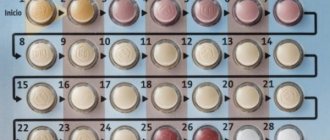Why do you not get your period when breastfeeding?
Breastfeeding and menstruation are interconnected. The hormone prolactin is responsible for milk production, which prevents the production of hormones in the ovaries1,2. At high concentrations of prolactin in the body, the menstrual cycle1 is absent as such. This means that menstruation becomes impossible during breastfeeding. It is known that the largest amount of this hormone is produced from 2 to 6 am. With frequent breastfeeding, the body constantly maintains a high concentration of prolactin1,2,3. This is why in women who breastfeed on demand, menstruation during breastfeeding begins later than in those who, from infancy, establish a diet with a long break at night2.
Up to contents
After natural childbirth
Immediately after separation of the placenta in the final stage of labor, a small amount of blood clots remain in the uterine cavity, which continue to be released for up to 7-10 days. Within 2-3 days after birth, the endometrium undergoes structural changes under the influence of progesterone; it is rejected and released out in the form of lochia (postpartum discharge).
During the first 3-4 days, suckers are bright, dark red in color, may have clots, then within about 10 days they become ichorous in nature, then up to 3 weeks they can have a yellowish color and have a mucous consistency.
Regenerative processes begin in the uterine cavity. The inner layer of the uterus is restored during the first 7-10 days. Normal endometrial thickness is achieved 3-4 weeks after birth. The cervix is formed within 3 days, but the internal os still remains open by 2-3 cm. And only by the end of the 1st week after birth the cervix will be completely formed. Ovarian function in the absence of breastfeeding is restored on average after 6- 8 weeks, that is, already 2-2.5 months after birth, the first menstruation can begin.
With regular breastfeeding, menstruation (lactational amenorrhea) may be absent throughout the entire lactation or until complementary foods are introduced. When a woman breastfeeds regularly, the pituitary gland produces large quantities of the hormone prolactin, which stimulates milk production. It blocks ovulation. With the introduction of complementary foods, the number of breastfeedings decreases and, accordingly, the synthesis of prolactin decreases. In this case, menstruation, as a rule, comes before the end of lactation, most often 6-7 months after childbirth, and you should start using protection at this time. If the baby’s diet was initially mixed, then menstruation is restored on average by the 4th month after birth.
When does the menstrual cycle return during breastfeeding?
For the majority of breastfeeding women, during lactation, menstruation resumes a year or a year and a half after childbirth, and in about a third, after 7–12 months2. For some young mothers, menstruation begins 3-6 months after birth2,3, in rare cases it does not come for more than 2 years3. If your periods are irregular for a long time while breastfeeding, it is recommended to consult a doctor.
Up to contents
What determines the timing of the onset of menstruation during breastfeeding?
From the frequency of breastfeeding.
If a woman frequently breastfeeds her baby (every 2-3 hours), the body maintains a high concentration of prolactin1,2,3, which inhibits the functioning of the ovaries. When the baby is supplemented with formula or new foods are introduced, the interval between feedings increases2,4. For this reason, prolactin levels drop and the cycle can be restored. If menstruation has already begun during lactation, it is no longer possible to “cancel” it by increasing the number of applications.
From the individual characteristics of the body.
The restoration of menstruation depends entirely on hormonal levels2. It is different for each woman, so the timing of the resumption of menstruation during breastfeeding can vary significantly. They are influenced by hereditary factors, body type, etc.
From the complexity of the birth.
Injuries and other complications in both mother and baby can affect the ability to breastfeed. For example, if the baby was born prematurely and does not suck milk well, the amount may decrease. At the same time, prolactin levels drop and menstruation may begin during breastfeeding. Complications in the mother also affect hormonal levels and the general condition of the reproductive system, and therefore the timing of restoration of reproductive function.
From the presence of chronic diseases of the genital area
. Inflammatory and infectious pathologies also affect the possibility of the onset of critical days during breastfeeding1. If menstruation does not return for a long time, this may be the first symptom of genital diseases. To clarify the cause of the pathology and select treatment, you must consult a doctor.
Up to contents
When should menstruation come when breastfeeding?
There are no exact dates for the arrival of menstruation during this period. They largely depend on whether the woman follows the feeding schedule and whether she gives the newborn complementary foods. It is noted that reproductive function is restored much faster if the child is on a mixed diet, and not exclusively on breast milk.
With pure breastfeeding
Delayed menstruation during lactation is considered normal. The timing of menstruation in women breastfeeding depends on several factors. If a young mother puts her baby to her breast on demand and does not refuse feeding at night, then she may not experience menstruation for more than six months.
In those cases when the interval between feedings is strictly maintained, during the day the child receives breast milk every three or even four hours, and at night he may not eat for an even longer period, then reproductive function will be restored faster. The arrival of the regula after childbirth can be expected after 3–4.
With mixed feeding
If a child receives special formulas in addition to mother’s milk, then the appearance of menstruation after childbirth while breastfeeding can be expected after 2–3 months. The presence of complementary foods helps to reduce prolactin concentrations and quickly restore reproductive function. The timing of the appearance of the first menstruation is shorter than in the case of exclusive breastfeeding.
Should I stop breastfeeding during my period?
Menstruation during lactation does not affect the quality of breast milk in any way, so there is no need to interrupt natural feeding. Processes in the mother’s body, contrary to popular belief, do not affect the quality of the baby’s nutrition5. On “these” days, milk does not change its taste and does not lose its beneficial properties. There is no need to replace it with the mixture. If your period comes while breastfeeding, the amount of milk under the influence of hormonal changes may decrease slightly - this is normal.
Up to contents
Features of menstruation during breastfeeding
Regularity.
During the first two or three cycles, periods during breastfeeding are irregular. They may arrive more often or less frequently than the standard 28 days1. If cycle disruptions persist for more than 3 months, you should consult a doctor.
Intensity.
If your period begins while breastfeeding, a woman may notice that there is more or less discharge than before giving birth. This is due to physiological changes that have occurred in the body. However, for some women, the intensity of menstruation remains the same1.
Soreness.
After giving birth, many women notice that menstruation is no longer accompanied by pain. This is due to changes in the position and shape of the uterus. However, for many, critical days are accompanied by the same discomfort as before. If your period comes during breastfeeding, you may experience discomfort in the lower abdomen associated with contractions of the uterus.
Up to contents
Using tampons during menstruation while breastfeeding
If you get your period while breastfeeding, a woman can use any hygiene products that are convenient for her, including ob®6 tampons. To feel comfortable during menstruation, choose products with optimal absorbency:
- o . b .® ProComfort Mini
or
Normal
are small, thin swabs with a silky SilkTouch™ surface and a tapered tip for even more comfortable insertion6. The best option for women whose periods during lactation have become scanty or moderately intense; - o . b .® ProComfort Super
or
Super Plus
– these hygiene products are convenient to use during normal or heavy periods. Thanks to FluidLockTM spiral grooves, tampons provide reliable protection against leaks6.
Up to contents
Literature
- IN AND. Duda. Obstetrics / study. - Minsk: RIPO, 2013, p. 70-71, 188-198.
- Jabbarova Yu.K. Lactational amenorrhea as a method of postpartum contraception // Jabbarova Yu.K., Rakhmankulova N.G. / Electronic scientific journal “Biology and Integrative Medicine” No. 5, 2021, p. 54-62.
- T.V. Ovsyannikova. Obstetrics and gynecology Gynecology - Current issues of postpartum contraception // T.V. Ovsyannikova, I.O. Makarov / Consilium Medicum, No. 02, 2013, p. 18-21.
- N.A. Osipova. Obstetrics and gynecology Gynecology - Problems of family planning after childbirth // N.A. Osipova, I.E. Zazerskaya / Consilium Medicum No. 05, 2013.
- I.N. Zakharova. History of breastfeeding: what prevented the natural way of feeding babies from ancient times to modern times? // I.N. Zakharova, I.M. Osmanov / MEDICAL COUNCIL No. 11, 2021, from 18-26.
- Using ob® tampons.
The main reasons for the absence of menstruation
If you miss your period and are not breastfeeding, the first thing you should do is take a pregnancy test. If the test is negative, you should consult a doctor, since a delay or complete absence of menstruation is often associated with quite serious problems:
- Hormonal imbalance : Since the menstrual cycle is regulated by hormones, hormonal dysfunction is the most common cause of absence of periods. It can be triggered by a variety of factors, for example, nutritional disorders, stress, diseases of the endocrine system, etc.
- Early menopause : With this disorder, menstruation may stop altogether, even if you have not yet reached the typical age for menopause - forty-five years. As a rule, amenorrhea in this case is accompanied by all the symptoms characteristic of menopause: hot flashes, decreased libido, vaginal dryness, etc.
- Polycystic ovary syndrome : with this pathology, the ovaries significantly increase in size, and at the same time the hormonal levels change, reproductive function is disrupted and amenorrhea occurs.
- Anomalies in the development of the organs of the reproductive system - in most cases we will be talking about congenital pathologies, for example, underdevelopment of the ovaries. In this case, amenorrhea is primary. Also, peculiar septa may form in the vagina, and amenorrhea will be called false. Its essence is that during a normal menstrual cycle, blood does not come out.
- Endocrine diseases - hypothyroidism and hyperthyroidism often cause the absence of menstruation in women; In addition, amenorrhea can be caused by tumors in the adrenal glands and obesity.
- An ectopic pregnancy is a pathological condition in which a fertilized egg attaches not to the wall of the uterus, but, for example, to the fallopian tube. It is characterized by the fact that the same signs are present as during a normal pregnancy: a positive test result, absence of menstruation.
- Infectious diseases of the genitourinary system, including sexually transmitted diseases.
- Brain diseases - tumor diseases, injuries and other lesions of the brain and pituitary gland, as well as endocrine diseases, contribute to disruption of the regulatory cycle and can provoke amenorrhea.
- Hydatidiform mole : this pathology is characterized by the formation of a tumor formation based on an egg that was previously fertilized, or on the placenta. In this case, the woman has all the signs of pregnancy, including the absence of menstruation and a positive test result. This pathology is rare and always requires urgent medical treatment.
- Anorexia is a progressive loss of body weight due to exhausting diets or excessive physical activity. As a rule, women suffering from anorexia experience mental disorders expressed in an obsessive desire to lose weight. In the absence of adequate nutrition, hormonal regulation is disrupted, weight decreases sharply, menstruation disappears, and other complications arise.
You may experience a lack of menstruation after surgical interventions in the pelvic organs, as well as an abortion. It is not uncommon for the menstrual cycle to be disrupted when taking hormonal medications or certain other types of medications. In addition, you may have a physiological delay in menstruation, which is often associated with a certain stage in a woman's life. As is the case with pregnancy and lactation, this condition is natural.










